New Delhi: A farmers’ organisation has moved the Supreme Court to oppose a petition seeking a moratorium on the release of GM Mustard, saying any judicial order against the use of GM crops would violate the rights of the farmers to “choose and live a dignified life”.
Shetkari Sanghatana, a pan-Maharashtra farmers’ group, has filed an intervention application in a pending case filed by activist Aruna Rodrigues, whose application seeks moratorium on the environmental release of GM Mustard.
Rodrigues had filed a petition in 2016 and then in 2021 opposing open-field trials or commercial release of herbicide tolerant (HT) crops, including GM Mustard. On 3 November, the petitioner informed the court that the SC-appointed technical expert committee (TEC) had recommended a total ban on all HT crops.
The farmers’ body wants the Supreme Court to hear its side before delivering any verdict on Rodrigues’s petition, as it claims the outcome of the case will “directly affect the interest of thousands of farmers, who have been using modern scientific techniques, such as GM seeds, for cultivation”.
The application was taken on record by the bench led by Justice Dinesh Maheshwari 17 November. The next hearing is on 29 November.
Also Read: Govt approves environmental release of GM mustard, paves way for commercial cultivation
‘GM crops answer to farmers’ economic woes’
Rodrigues’ ideological assertions are inimical to interests of farmers and their livelihood and the anti-GM crusaders also seem unconcerned with the rising food insecurity and global inflation, the Sanghatana has told the top court, adding that GM crops are an answer to the economic woes of India farmers. Hence, a blanket ban may be a “death knell” for dreams of several farmers from Maharashtra, Gujarat and Punjab, who use scientific means of cultivation.
Meanwhile, in its affidavit filed on 10 November, the Centre made a strong pitch for GM mustard in the top court, claiming its domestic production will reduce India’s dependency on other countries.
This is the second instance when the Sanghatana has come out in support of the central government on agricultural policy. Earlier, the Sanghatana had favoured the three farm laws, which were repealed by the government following large-scale protests.
Through its application, the Sanghatana has strongly advocated the use of GM technology to improve the living condition of farmers. A ban on it would “worsen the plight of farmers as the old-method of farming has proved to be a failure in dry regions of India,” the farmers’ organisation submitted in its application.
“The Sanghatana firmly believes that the farmers should be free to choose GM technology as a ban on use of GM seeds would make them dependent on old methods of farming, and deteriorate their living conditions,” it stated.
The organisation further maintained that any direction against the use of GM crops would “violate the rights of these farmers to choose and live a dignified life”.
Asserting the right of farmers to have a decent livelihood, the Sanghatana said that the Constitution provides freedom to choose profession and that this cannot be overlooked based on some “unfounded and superstitious belief of the petitioners”.
The plea gave the example of Bt Cotton to highlight the success of GM seeds. The Sanghatana claimed the yield of Bt Cotton as compared to traditional seeds is four times and has immensely benefitted the farmers, particularly those in Maharashtra.
“Bt Cotton has not only elevated life conditions of farmers by increasing crop yields but has also given them the opportunity and means to indulge with more scientific methods of farming,” it said. As per the submission, there has been no report of any harm to the environment or livestock due to Bt Cotton.
The farmers in Maharashtra have also reported decrease in dependency on huge quantities of water and better quality of soil due to use of Bt Cotton, according to the plea. Also, Bt Cotton has reduced pesticide application, helping to prevent at least million cases of cancer per year in India.
Raising objections on technical grounds, the farmers’ body said that the relief sought by Rodrigues are “purely policy related” and fall within the powers of the executive. “The judiciary ought not to assume jurisdiction to alter the regulatory regime set by the Rules for the manufacture, use, import, export and storage of hazardous microorganisms, genetically engineered organisms or cells, 1989 and the Environment Protection Act, 1986,” it contended.
According to the Sanghatana, since the matter is a “polycentric issue”, it is best that the matter is dealt with by the executive that represents the will of the people. “The Executive can consider the macro-economic factors and expert opinions and will be able to negotiate and balance various considerations and interests,” the application argued.
(Edited by Anumeha Saxena)
Also Read: Indian scientists say GM mustard will help boost crop yields, cut vegetable oil imports






